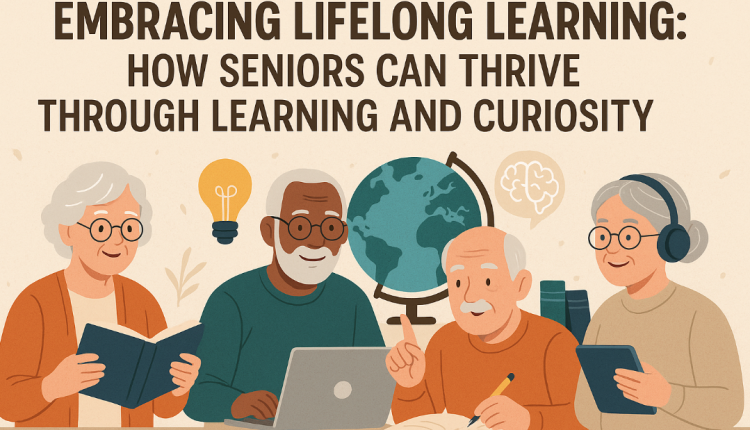As we grow older, the joy of discovery doesn’t have to fade—it can become richer, more meaningful, and more empowering than ever. For many seniors, retirement or life transitions offer the perfect opportunity to embrace lifelong learning and curiosity. Far from simply filling time, engaging in new pursuits can boost mental health, strengthen social connections, and even support physical well-being. Here’s how seniors can thrive through learning and how to make the most of this exciting chapter in life.
1. The Powerful Benefits of Learning at Any Age
Mental Stimulation and Cognitive Health
Studies show that actively learning new skills—whether it’s a language, musical instrument, or painting—can enhance neuroplasticity. This “use-it-or-lose-it” approach helps sharpen memory, improve attention, and may even delay cognitive decline. Whether tackling a challenging jigsaw puzzle or mastering an online course, every new concept enriches brain health.
Emotional Well-Being
Learning stimulates dopamine release, the neurotransmitter often associated with pleasure and motivation. Achieving small milestones—like finishing a weekend art project or completing a lesson—creates a sense of purpose and satisfaction. This positive momentum can lift mood and promote a more optimistic outlook.
Social Connections
Joining a class or club brings tremendous social benefits. Shared interests foster friendships, conversation, and laughter, helping to reduce loneliness. Whether in-person through a community center or virtually via video chat, group learning nurtures a sense of belonging and camaraderie.
2. Choosing the Right Path: How to Start
Align Learning with Your Passion
Think about what fascinates you. Curious about local history? Try archival research or storytelling workshops. Love gardening? Take a horticulture course or join a plant-exchange club. Desire to travel? Learn a language or take cooking classes tied to regions you’d like to visit. When learning resonates with your emotions, it becomes enriching and joyful.
Mix Convenient Formats
Look for flexible options: in-person classes at libraries, community colleges, or senior centers; online webinars and Massive Open Online Courses (MOOCs); or small-group workshops. Hybrid learning—partly in-person, partly virtual—works well for those seeking a blend of social interaction and convenience.
Set Realistic Goals
Avoid overwhelm by establishing clear, manageable goals. Instead of saying, “I’ll become fluent in French,” commit to “I’ll learn ten new words a week” with a 10-minute daily practice routine. Celebrate small victories and gradually expand your learning ambition.
3. Tips to Maximize Learning Success
Build a Routine
Designate regular learning blocks in your week. For example, “Wednesdays and Fridays, 2–3 pm: photography fundamentals.” Creating this structure ensures steady progress and helps new learning habits take root.
Leverage Technology
Stay curious about digital tools. Language apps like Duolingo, video chat for virtual group meetups, and easy-to-use platforms like Coursera or Skillshare open up endless possibilities. If needed, ask a family member or friend for an introduction to basic tech skills—it’s an investment in your independence.
Track Your Journey
Keep a dedicated journal of what you learn, reflect on insights, and note progress areas. Add photos of completed projects or certificates earned. Seeing how far you’ve come can keep you motivated and engaged.
Teach Others
One of the most rewarding ways to deepen learning is by sharing it. Mentor younger people, co-host a local workshop, or simply explain your project to friends. Teaching reinforces your own understanding and enhances social connections.
4. Inspiration: Learning Ideas for Seniors
- Creative Arts: Try watercolor painting, beginner digital photography, poetry writing, or pottery classes.
- Language & Culture: Explore a new language, study regional cuisine, or join music appreciation groups.
- Digital Skills: Learn email and social media basics, blog writing, or creating simple podcasts.
- Lifelong Wellness: Take yoga practice, tai chi, or meditation classes. Combine body and mind benefits.
- History & Genealogy: Dive into local archives or explore family trees through online genealogy courses.
- STEM Exploration: Venture into amateur astronomy, learn to code with Scratch or Python, or build simple robotics kits.
- Civic Engagement: Attend civic leadership training, volunteer for environmental cleanup projects, or join voter education efforts.
5. Overcoming Challenges and Staying Motivated
Manage Frustration
New skills can feel difficult at first. If you hit a snag, remember it’s part of growth. Break lessons into smaller steps, take short breaks, and ask for help if needed.
Avoid Overcommitment
Select one or two main learning projects at a time. Juggling too many can lead to burnout. It’s better to deeply engage in a few pursuits than spread yourself thin.
Get Support
Share your learning passion with friends or family. Consider team-based approaches: find a ‘learning buddy’ or start a community group. Accountability and encouragement make learning richer.
6. Celebrating a Life of Curiosity
As we age, curiosity enriches life by offering personal growth, creativity, mental stimulation, and meaningful social bonds. Embracing lifelong learning not only helps seniors stay connected and sharp—it also cultivates joy and pride. No matter your pace, every small step expands horizons. At any age, it’s never too late to begin something new.
So go ahead: enroll in that creative writing course, pick up a new language, learn to garden locally, start an amateur radio license, play with digital art tools. Each new chapter is proof that thriving is timeless—and learning never ends.


